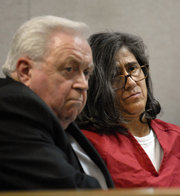Sheriff apologizes for missed chance to rescue Jaycee Lee Dugard
Friday, August 28, 2009
Contra Costa County Sheriff
Warren Rupf apologizes at news conference
Jose Luis Villegas / jvillegas@sacbee.com
Phillip Craig Garrido with his attorney Susan Gellman during his arraignment
at the El Dorado Superior Court in Placerville. Garrido and his wife, Nancy
Garrido, were charged with 28 felony counts, including rape, in the 1991 abduction
of Jaycee Lee Dugard.
*

Nancy Garrido was arraigned in El Dorado County Superior Court in Placerville. She and her husband, Phillip Garrido, pled not guilty to all counts, including kidnapping, rape and conspiracy charges in the abduction of Jaycee Lee Dugard.

Pictured is the backyard of the home of Phillip and Nancy Garrido in Antioch. Authorities say Jaycee Lee Dugard lived in these tents and structures after she was kidnapped 18 years ago and also gave birth to two children there.
Popular Comment
My jaw is still on the floor from yesterday's news, but today I'm just in awe
and pissed off. To think that taxpayers are going to front the bill for this
sorry excuse for a human and his wife's trial just makes my stomach churn. AND,
to think that they may get life in prison... where they will get, food, tv,
a warm bed, medical care, dental care, computer/internet access, and education
if they choose ... makes me STEAM!!!!!!!!!!! Jaycee has spent her last 18 years
without education, medical, dental, and bore 2 children at the house without
medical intervention. But this 'religious' satanic man will get everything???????
What's wrong with the world???!!!???!!!!!!!
By Sam Stanton
sstanton@sacbee.com
Aug. 28, 2009
As anger mounted over how law enforcement missed the chance to rescue Jaycee Lee Dugard for 18 years as she was held by a convicted rapist, the Contra Costa County sheriff issued an extraordinary apology today for missing an opportunity two years ago to save her.
"I can't change the course of events, but we are beating ourselves up over this and are the first to do so," Sheriff Warren E. Rupf told a press conference.
Rupf confirmed that neighbors of suspect Phillip Garrido, accused of hiding Dugard in his back yard for 18 years in Antioch, called 911 Nov. 30, 2006, to warn that there were children in the home and that people appeared to be living in tents in the backyard.
But the deputy who responded never entered the house or checked the yard, Rupf said, missing "an opportunity to rescue Jaycee."
"There are a lot of reasons that go into these things," he said. "There are no excuses. I am not offering excuses."
Rupf said that 911 call was the only record of law enforcement being called to the home. He added that Garrido was an "animal" who never could have abducted Dugard if he had not been released early from a 50-year federal sentence for an earlier kidnap and rape conviction.
The apology came as concerns mounted today over whether various agencies had missed opportunities to rescue the 11-year-old girl who was kidnapped from her neighborhood in El Dorado County near South Lake Tahoe in 1991.
State corrections officials were still unable today to pinpoint the last time Garrido, a registered sex offender on lifetime parole, was visited at home by his parole agent.
They also could not explain how Garrido was able to allegedly conceal Dugard in his back yard for 18 years without parole agents noticing.
Garrido and his wife, Nancy, were arraigned about 1 p.m. today in El Dorado Superior Court and both pleaded not guilty to all counts, including kidnapping, rape and conspiracy charges.
Nancy Garrido was shaking with emotion as the court proceeding took place and she was ordered held without bail.
A 16-page criminal complaint filed a short time ago charges both with multiple counts of kidnapping, rape and other counts, and seeks to charge Phillip Garrido with two prior strikes from his kidnap-rape convictions in 1977. That means be could be subject to 25 years to life as a third-striker, if convicted, although District Attorney Vern Pierson said in a statement that both suspects could face multiple life terms.
They were arrested after a search of their Antioch home Wednesday, and after Dugard was found to be alive and now the mother of two of Garrido's children she bore in captivity the case exploded into international headlines. News outlets from the BBC to Al Jazeera have sought interviews with reporters covering the case and others involved.
"I've talked to the BBC four times in the last 15 hours," said former U.S. Attorney McGregor Scott, who is helping Pierson deal with the crush of media.
Readers have filled news Web sites with angry questions about how Dugard could have gone unnoticed for so long.
Dugard was reunited with her mother Thursday, but both remained out of sight while they deal with the trauma of her abduction from her El Dorado County home and its aftermath.
The failings in the case also sparked new criticism of the state's proposal to reduce its inmate population by more than 27,000 prisoners, in part by releasing prisoners and relying more heavily on parole.
"This demonstrates the problems that we're going to have if we release thousands of prisoners into our local communities," said state Sen. Tom Harman, R-Huntington Beach.
"Here was a prisoner who was a very great danger to the community. The parole people knew it, he was supposedly being checked three times a month, and still he was able to perpetrate this crime that lasted over 18 years."
Harman, who has criticized Schwarzenegger administration plans to reduce the state's inmate population, said the Dugard case demonstrates the danger of relying on GPS or parole to protect the public.
But Senate President Darrell Steinberg disputed that, saying Garrido would not have been free if the plan being pushed now had passed.
"Under our reform proposal, an offender like Phillip Garrido would have never been granted alternative custody," Steinberg said. "In fact, the parole reforms passed by the Senate increase parole agents' ability to more effectively monitor this kind of sex offender.
"This tragedy highlights the need to pass serious and comprehensive criminal justice reform. Our resources must be marshaled to crack down on offenders like Phillip Garrido. He is the poster child for the need to reduce parole officer caseloads and increase monitoring like the Senate voted to do last week."
Questions arise over how kidnapper went undetected
http://news.yahoo.com/s/ap/us_kidnapped_girl_found

A tent is set up the far backyard of a home in Antioch, Calif.,
Aug. 28, AP
* Kidnapped Calif. girl emerges 18 years later Slideshow:Kidnapped Calif. girl emerges 18 years later
By TERRY COLLINS and BROOKE DONALD, Associated Press Writers
ANTIOCH, Calif. – His neighbors knew he was a registered sex offender. Kids on his block called him "Creepy Phil" and kept their distance. Parole agents and local law enforcement regularly visited his home and found nothing unusual, even after a neighbor complained children were living in a complex of tents in his backyard.
For 18 years, Phillip Garrido managed to elude detection as he pulled off what authorities are calling an unfathomable crime, kidnapping and raping 11-year-old Jaycee Dugard, keeping her as his secret captive for nearly two decades and fathering her two children.
The question about how he went unnoticed became more pressing Friday when Garrido came under suspicion in the unsolved murders of several prostitutes in the 1990s, raising the prospect he was a serial killer as well. Several of the women's bodies — the exact number is not known — were dumped near an industrial park where Garrido worked during the 1990s.
Authorities acknowledged that they blew a chance three years ago to rescue Dugard from the backyard labyrinth of sheds, tents and outbuildings that were concealed from the outside world.
A neighbor called 911 in November 2006 and described Garrido as a psychotic sex addict who was living with children and had people staying in tents in his backyard.
The investigating officer spent a half-hour interviewing Garrido on his front porch but did not enter the house or search the backyard, Contra Costa County Sheriff Warren E. Rupf said. The deputy, who did not know Garrido was a registered sex offender even though the sheriff's department had the information, warned Garrido that the tents could be a code violation before leaving.
"We missed an opportunity to bring earlier closure to this situation," Rupf acknowledged. "I cannot change the course of events but we are beating ourselves up over this and continue to do so."
"We should have been more inquisitive, more curious and turned over a rock or two."
It was not the only missed opportunity.
As a parolee, Garrido wore a GPS-linked ankle bracelet that tracked his every movement, met with his parole agent several times each month and was subject to routine surprise home visits and random drug and alcohol tests, California Department of Corrections and Rehabilitation spokesman Gordon Hinkle said.
The last unannounced visit by a team of local police agencies was conducted in July 2008. Paramedics also were summoned to the house five times since 1999, presumably to help Garrido's 88-year-old mother, who had dementia.
"There was never any indication to my knowledge that there was any sign of children living there," Hinkle said.
As it turns out, Dugard and her two children were living there as prisoners, authorities say. The heavily wooded compound was arranged so that people could not view what was happening, and one of the buildings was sound-proofed and could only be opened from the outside.
Neighbors knew there were children living there. Damon Robinson has lived next door to the Garridos for more than three years and his then-girlfriend in 2006 told him she saw tents in the backyard and children.
"I told her to call police. I told her to call right away," he said.
Dugard, now 29, was reunited with her family and said to be in good health, but feeling guilty about developing a bond with Garrido over the years. Her two children, 11 and 15, remained with her.
"Jaycee has strong feelings with this guy. She really feels it's almost like a marriage," said Dugard's stepfather Carl Probyn, who was there when little Jaycee was snatched from a bus stop in 1991.
Probyn has been in constant contact with Dugard's mother, his ex-wife Terry Probyn, since she found out her daughter was alive on Wednesday.
Probyn said both mother and daughter are trying to avoid the public eye for now. After not seeing each other for 18 years, Dugard greeted her mother by saying, "Hi, mom, I have babies," according to Probyn. Dugard had her two daughters with her at the reunion, and it appears she never told them she was kidnapped by their father, he said.
She is now free thanks in large part to two quick-thinking police employees at the University of California, Berkeley who came across a rambling Garrido this week, with Dugard's two daughters in tow. He was on campus because he wanted to hold some sort of religious event.
Garrido seemed incoherent and mentally unstable, and the girls wore drab-colored dresses, were unusually subdued, had an unnaturally pale complexion and appeared robotic and rehearsed when they spoke, said Lisa Campbell. They said they were home-schooled by their mother and had a 29-year-old sister at home.
Colleague Ally Jacobs ran a background check on Garrido and notified his probation officer. On Wednesday, Garrido arrived at the probation officer's building with his wife, the two girls and a woman who initially identified herself as Allissa. She turned out to be Dugard and investigators said Garrido confessed to the kidnapping.
The authorities say they do not yet know whether she ever tried to escape or to alert anyone of her whereabouts, but she had chances to escape Garrido, who did a stint behind bars during the period of captivity.
Garrido and his wife pleaded not guilty Friday to a total of 29 counts, including forcible abduction, rape and false imprisonment. Phillip Garrido appeared stoic and unresponsive during the brief arraignment hearing. His wife cried and put her head in her hands several times.
Garrido gave a rambling, sometimes incoherent phone interview to KCRA-TV from the county jail Thursday in which he said he had not admitted to a kidnapping and that he had turned his life around since the birth of his first daughter 15 years ago. He told the television station that he walked into the FBI's San Francisco office on Monday with Dugard's daughters and dropped off several documents containing rambling passages about religion, sexual compulsion and mind control.
FBI spokesman Joseph Schadler confirmed Garrido left the documents with the agency, but declined to discuss any further details.
Garrido was required to register as a sex offender because he was convicted in 1977 of kidnapping a 25-year-old woman from parking lot in South Lake Tahoe, the same town Jaycee Dugard lived in when she was snatched from a school bus stop.
He was convicted of raping the woman multiple times at a Reno storage unit that the investigator from the case described as a "sex palace." It featured various sex aids, sex magazines and videos, stage lights, wine, and a bed, said investigator Dan DeMaranville.
Gail Powell, spokeswoman for the Nevada Department of Public Safety, said Garrido met his wife while he was serving time for the rape at the federal penitentiary in Leavenworth, Kan.
He served about 10 years of a 50-year federal sentence for kidnapping, and less than a year for a concurrent Nevada sentence of five years to life in prison for sexual assault. He was paroled in 1988, said Nevada Department of Corrections spokeswoman Suzanne Pardee.
A violation of Garrido's parole conditions sent him back to federal prison from April to August of 1993. Dick Carelli, spokesman for the federal Office of Court Administration, did not know what Garrido did to violate parole. Authorities are trying to piece together how and by whom Dugard was held during Garrido's four-month absence.
Hinkle said the alarm raised by the neighbor who contacted the sheriff's department never was relayed to Garrido's parole agent. But there was no ban on him having contact with children, nor restrictions on his travels.
Monica Adams, 33, whose mother lives on their street, said she knew Phillip Garrido was a sex offender and that he had children living with him. Other neighbors knew, too, but they assumed police were keeping tabs on him.
"He never bothered any one, he kept to himself," Adams said. "What would we have done? You just watch your own."
Probyn said he was frustrated to find out that a car matching the description of the one he saw speeding Dugard away in the day she was kidnapped was found in the yard of Garrido's home. Nancy Garrido also fits the "dead-on" description he gave of the woman who pulled her into the car, he said.
"He had every break in the world," Probyn said of Garrido's close encounters with the law.
___
Associated Press Writers Don Thompson in Sacramento, Terence Chea in Berkeley, Paul Elias in San Francisco, Juliet Williams in Placerville, Michelle Rindels in Orange, Calif., and Martin Griffith in Reno, Nev., contributed to this story.